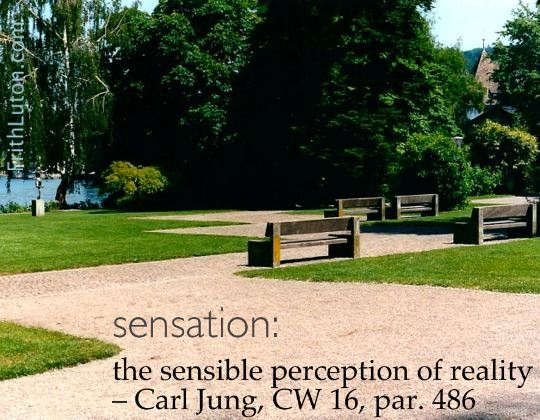Sensation. The psychological function that perceives immediate reality through the physical senses. (Compare intuition.)
An attitude that seeks to do justice to the unconscious as well as to one’s fellow human beings cannot possibly rest on knowledge alone, in so far as this consists merely of thinking and intuition. It would lack the function that perceives values, i.e., feeling, as well as the fonction du réel, i.e., sensation, the sensible perception of reality. [“The Psychology of the Transference,” CW 16, par. 486.]
In Jung’s model of typology, sensation, like intuition, is an irrational function. It perceives concrete facts, with no judgment of what they mean or what they are worth.
Sensation must be strictly differentiated from feeling, since the latter is an entirely different process, although it may associate itself with sensation as “feeling-tone.” Sensation is related not only to external stimuli but to inner ones, i.e., to changes in the internal organic processes. [“Definitions,” CW 6, par. 792.]
Jung also distinguished between sensuous or concrete sensation and abstract sensation.
Concrete sensation never appears in “pure” form, but is always mixed up with ideas, feelings, thoughts. … The concrete sensation of a flower … conveys a perception not only of the flower as such, but also of the stem, leaves, habitat, and so on. It is also instantly mingled with feeling of pleasure or dislike which the sight of the flower evokes, or with simultaneous olfactory perceptions, or with thoughts about its botanical classification, etc. But abstract sensation immediately picks out the most salient sensuous attribute of the flower, its brilliant redness, for instance, and makes this the sole or at least the principle content of consciousness, entirely detached from all other admixtures. Abstract sensation is found chiefly among artists. Like every abstraction, it is a product of functional differentiation. [Ibid., par. 794.]
© from Daryl Sharp’s Jung Lexicon, reproduced with kind permission of the author.
